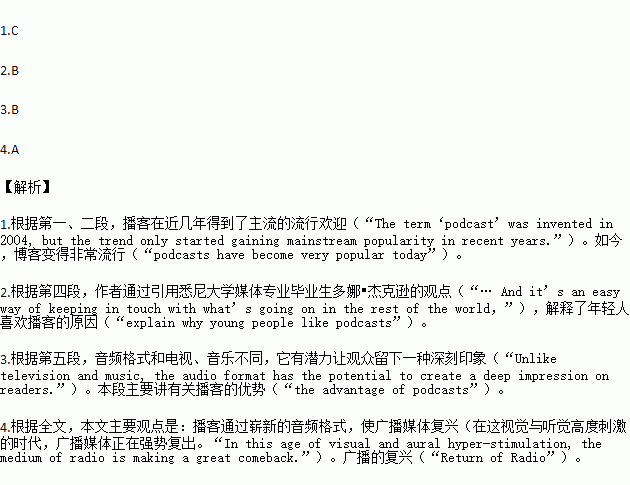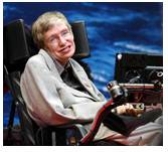题目内容
Every day we are exposed to images, videos, music and news.In this age of visual and aural hyper stimulation, the medium of radio is making a great comeback.
“We’re at the beginning of a golden age of audio,” said US based podcaster Alex Blumberg in an article in The Sydney Morning Herald.In the last month alone, 15 percent of US adults listened to a radio podcast (播客).These statistics, released by Edison Research, show the successful evolution of traditional radio broadcasts to the present day’s digital podcast format.The term “podcast” was invented in 2004, but the trend only started gaining mainstream popularity in recent years.With the sharp increase in consumer demand for smartphones and tablets, podcast sales have jumped.
The appeal of the podcast partly lies in its multiplatform delivery and on demand capabilities (功能).You can listen during those extra minutes of the day when you’re walking to the shops, waiting in a queue or riding the subway.Similar to television shows, podcasts are generally free to download and most offer new content every week.
Donna Jackson, 22, Sydney University media graduate, listens to podcasts two or three times a week, via iTurns.“I listen while I’m wandering around the house doing something else.It makes completing a boring task much more enjoyable… And it’s an easy way of keeping in touch with what’s going on in the rest of the world,” she said, “I mainly listen to BBC podcasts, but recently I’ve also been listening to This American Life and Serial.They have a special skill to really draw you in.”
Unlike television and music, the audio format has the potential to create a deep impression on readers.Blumberg says this owes to the podcast’s ability “to create close relationship and emotional connection.” Sydney University undergraduate Hazel Proust, majoring in social work and arts, agrees.“When you’re listening, it feels as if the voice of the podcast’s storyteller is talking directly to you.It’s comforting, ” said Proust.
It seems the age old tradition of verbal storytelling is very much alive and well.
1.From the first two paragraphs, we can learn that ________.
A.traditional broadcast has come back
B.Americans love listening to the radio
C.podcasts have become very popular today
D.smartphones sell well because of podcasts
2.The writer mentions Donna Jackson mainly to ________.
A.tell how young people relax themselves
B.explain why young people like podcasts
C.introduce what programs podcasts are presenting
D.show how popular podcasts are presenting
3.Paragraph 5 is mainly about ________.
A.the influence of radios
B.the advantage of podcasts
C.readers’ impression on radios
D.people’s reaction to the medium
4.What is probably the best title of the passage?
A.Return of Radio
B.Opinions of Podcast
C.Features of Radio
D.Technology of Podcast
 新活力总动员暑系列答案
新活力总动员暑系列答案 龙人图书快乐假期暑假作业郑州大学出版社系列答案
龙人图书快乐假期暑假作业郑州大学出版社系列答案Simon Sinek is naturally shy and doesn’t like speaking to crowds.At parties,he says he hides alone in the corner or doesn’t even show up in the first place.He prefers the latter.Yet,with some 22 million video views under his belt,the optimistic ethnographer also happens to be the third most watched TED Talks presenter of all time.
Sinek’s unlikely success as both an inspirational speaker and a bestselling author isn’t just dumb luck.It’s the result of fears faced and erased,trial and error and tireless practice,on and off stage.Here are his secrets for delivering speeches that inspire,inform and entertain.
Don’t talk right away.
Sinek says you should never talk as you walk out on stage.“A lot of people start talking right away,and it’s out of nerves,” Sinek says.“That communicates a little bit of insecurity and fear.”
Instead,quietly walk out on stage.Then take a deep breath,find your place,wait a few seconds and begin.“I know it sounds long and tedious and it feels excruciatingly awkward when you do it,” Sinek says,“but it shows the audience you’re totally confident and in charge of the situation.”
Show up to give,not to take.
Often people give presentations to sell products or ideas,to get people to follow them on social media,buy their books or even just to like them.Sinek calls these kinds of speakers “takers,” and he says audiences can see through these people right away.And,when they do,they disengage.
“We are highly social animals,” says Sinek.“Even at a distance on stage,we can tell if you’re a giver or a taker,and people are more likely to trust a giver — a speaker that gives them value,that teaches them something new,that inspires them — than a taker.”
Speak unusually slowly.
When you get nervous,it’s not just your heart beat that quickens.Your words also tend to speed up.Luckily Sinek says audiences are more patient and forgiving than we know.
“They want you to succeed up there,but the more you rush,the more you turn them off,” he says.“If you just go quiet for a moment and take a long,deep breath,they’ll wait for you.It’s kind of amazing.”
Turn nervousness into excitement.
Sinek learned this trick from watching the Olympics.A few years ago he noticed that reporters interviewing Olympic athletes before and after competing were all asking the same question.“Were you nervous?” And all of the athletes gave the same answer: “No,I was excited.” These competitors were taking the body’s signs of nervousness—clammy hands,pounding heart and tense nerves—and reinterpreting them as side effects of excitement and exhilaration.
When you’re up on stage you will likely go through the same thing.That’s when Sinek says you should say to yourself out loud,“I’m not nervous,I’m excited!”
Say thank you when you’re done.
Applause is a gift,and when you receive a gift,it’s only right to express how grateful you are for it.This is why Sinek always closes out his presentations with these two simple yet powerful words: thank you.
“They gave you their time,and they’re giving you their applause.” Says Sinek.“That’s a gift,and you have to be grateful.”
Passage outline | Supporting details |
1.to Simon Sinek | ·He is by 2.shy and dislikes making speeches in public. ·Through his 3.effort,he enjoys great success in giving speeches. |
Tips on deliveing speeches | ·Avoid talking 4.for it indicates you’re nervous. ·Keep calm and wait a few seconds before talking, which will create an 5.that you are confident. |
·Try to be a giver rather than a taker because in 6.with a taker, a giver can get more popular and accepted. ·Teach audience something new that they can 7.from. | |
·Speak a bit slowly just to help you stay calm. ·Never speed up while speaking in case you 8.the audience. | |
·Switch nervousness to excitement by 9.the example of Olympic athletes. | |
·Express your 10.to the audience for their time and applause to conclude your speech. |


